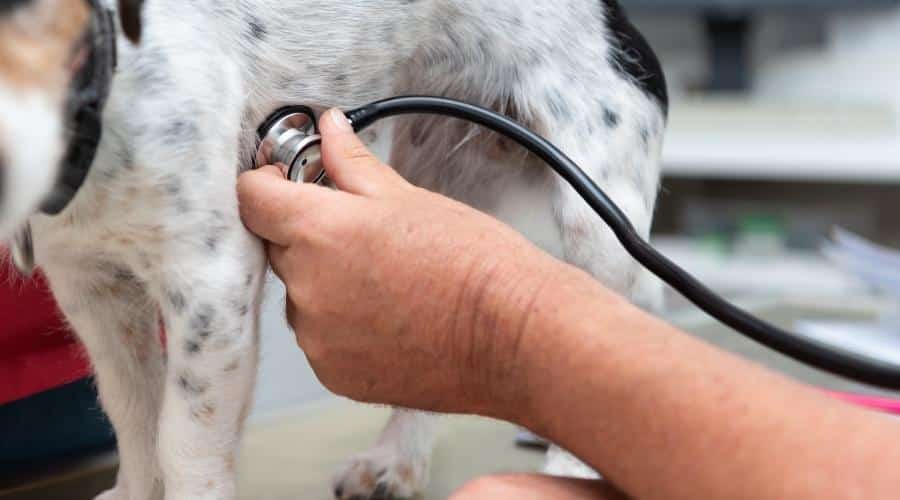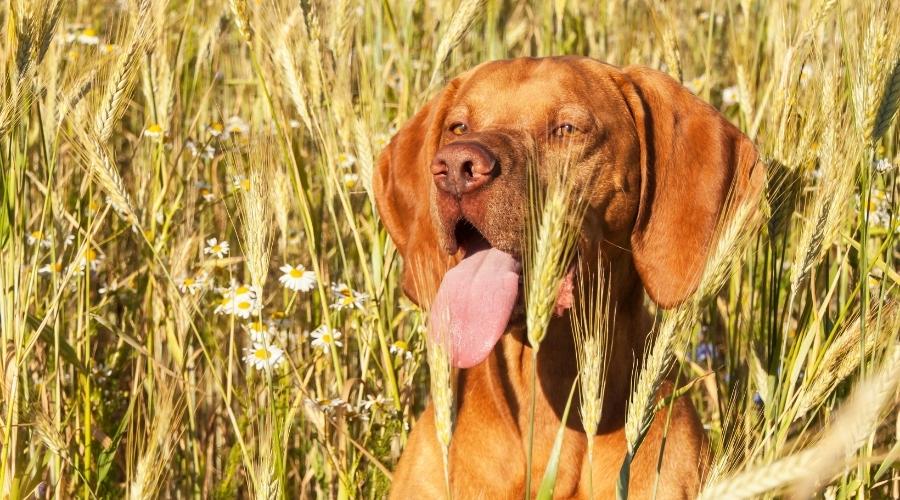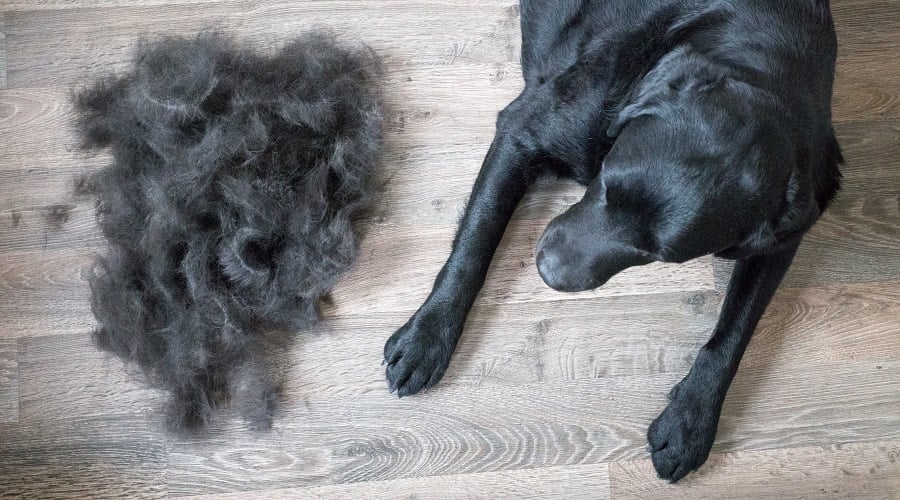Is There A Link Between Grain-Free Diet And Heart Health?
When you purchase through links on our site, we may earn a commission. Here’s how it works.
As pet parents, we’re always looking for the best dog food to keep our canine companions as healthy as possible. So, when a new type of diet comes along claiming to have health benefits for your dog, it’s natural to want to try it.
Table of Contents
But what if, despite its benefits, your dog’s new diet has the potential to cause them other health problems in the future? That would be a real worry, right? Well, grain-free diets might be an example of this.
So, what is a grain-free diet? What are the potential benefits of feeding a grain-free diet to your dog? And is there a possible link between grain-free diets and canine heart health? Let’s find some answers.
What Does Grain-Free Mean?

Grain-free dog food doesn’t contain any cereals (and we do not mean the sugary kind!). This means it’s free from wheat, barley, rye, oats, maize, rice, and millet, as well as other less well-known cereals. However, because dogs need a balance of nutrients in their dog food, provided by more than just meat, cereals have to be replaced by another source of plant protein and carbohydrates. In many grain-free diets, cereals are replaced by vegetables. Commonly, leguminous vegetables like beans, peas, and lentils are used.
Many people wrongly assume that the terms grain-free and gluten-free mean the same thing, but some cereals are gluten-free in addition to grain-free. So, if you want to avoid giving your dog gluten, they don’t necessarily have to have a grain-free diet.
Are There Benefits To A Grain-Free Diet?

The main reason people choose to feed their dog a grain-free diet is to avoid symptoms from an allergy or intolerance to cereals. Like people, dogs can get food allergies, and the most common food allergies in dogs are beef, lamb, chicken, and dairy products. It’s also possible for dogs to be allergic to grains.
It’s important to remember that food allergies in dogs don’t seem to be as common as in humans, and grain allergies account for a tiny proportion of dog food allergies. So, grain allergies in dogs are very rare. If your furry friend has an allergy, you might notice symptoms like diarrhea, gas, bloating, vomiting, skin rashes, and itching. A grain-free diet helps relieve these symptoms, but only if the allergy is to cereal.
If you want to learn about your dog’s possible allergies, you can do an at-home dog allergy test from EasyDNA. But be sure to check in with your vet before making any big changes based on the results.
Why Should You Choose A Nutritionally Balanced And Complete Diet For Your Dog?
A nutritionally complete and balanced diet is vital for your dog to ensure they stay healthy. A diet deficient in a particular vitamins, minerals, or another nutrients can have serious consequences. So, this is why homemade or boutique diets carry some risks to your pet. Still, commercial dog foods that are nutritionally complete shouldn’t be a problem, should they?
Well, sometimes, even if a nutrient is present in the right amount in a food, it is not bioavailable. This means that your dog cannot absorb or process it and can be just as damaging to your dog’s health as if the nutrient weren’t in the dog food at all.
Is A Grain-Free Diet Bad For Your Dog’s Health?

Many grain-free diets contain a large proportion of leguminous vegetables, like beans, peas, and lentils. These are a replacement for the cereals, so the diet still contains plant proteins and carbohydrates, but from a different source. Research has shown a possible link between grain-free diets and heart disease, specifically Dilated Cardiomyopathy (DCM). The type of DCM that has arisen in dogs fed a grain-free diet is related to a deficiency in the amino acid taurine.
What Is Dilated Cardiomyopathy?
Dilated Cardiomyopathy (DCM) is a condition where the heart’s muscular walls become thin and stretched as the heart becomes larger. The thinner walls are unable to contract as well, so the heart becomes less effective at pumping blood around the body. Each time the heart contracts, almost all of the blood should be squeezed out of the chambers. In a dog with DCM, the heart contraction isn’t powerful enough to squeeze the blood out.
Dogs with DCM are also more prone to heart rhythm disturbances, which can be fatal. In dogs, DCM can be caused by genetics, and certain breeds are predisposed. However, it can also be caused by nutritional deficiencies, like taurine.
Facts About Grain-Free Diets And Your Dog’s Heart Health?

It’s important to realize that the risks associated with grain-free diets in relation to heart health are not fully understood. However, it’s thought that the high protein content of leguminous vegetables in addition to meat is the root of the problem. Legumes may not be as rich in amino acids as cereals, or the amino acids may not be as bioavailable. Hence a taurine deficiency can develop. In a study of Golden Retrievers with taurine deficiency DCM, 23 of the 24 dogs were fed a grain-free diet or a diet rich in legumes, like peas, beans, legumes, and potatoes.
Are Grain-Free Diets Safe?
The mechanism that causes grain-free diets to lead to taurine deficiency isn’t fully understood, and it’s thought to be a combination of factors. However, until the risks are fully understood, it’s best to follow a few guidelines to keep your furry family member safe.
It may be sensible to avoid grain-free diets if their ingredients list shows legumes within the first ten ingredients. Thirdly, suppose your dog is a breed that is already predisposed to taurine deficiency DCM, like Cocker Spaniels, Cavalier King Charles Spaniels, Golden Retrievers, Newfoundlands, and Saint Bernards. In that case, it might be best to avoid grain-free or legume-rich diets altogether.
Frequently Asked Questions
Does a grain-free diet for dogs cause heart disease?
A potential link has been shown between grain-free diets and heart disease. Studies have shown that a significant number of dogs fed a grain-free or legume-rich diet have subsequently developed a deficiency in the amino acid taurine. Taurine deficiency commonly leads to a condition called Dilated Cardiomyopathy (DCM). Although some dog breeds are predisposed to developing taurine deficiency DCM, many dogs of other breeds have also been affected.
Why might grain-free diets cause DCM?
Taurine deficiency is one of the primary causes of DCM in dogs. It is not fully understood why grain-free diets cause DCM, but dogs who are affected have a taurine deficiency. This suggests that grain-free diets don’t contain enough taurine or that dogs cannot absorb and utilize taurine from these diets.
What is wrong with grain-free dog food?
Your dog’s diet should be nutritionally complete and balanced for them to stay as healthy as possible. Some homemade or boutique diets don’t contain the right balance of ingredients to provide your dog with the nutrients they need. Grain-free diets often use legumes as a replacement for cereal-based ingredients. Legume-rich diets appear to be risky because they either don’t contain enough taurine, or the taurine is not bioavailable.
Final Thoughts
Ultimately, as a pet parent, the choice of what to feed your precious pal is up to you. However, when you consider the relatively low risk that your dog has an allergy or intolerance to a grain, compared to the more significant risk that grain-free diets may pose, you might well decide not to choose a grain-free diet, at least for now. But, if you are still curious if it might benefit your dog, check with your vet to see what they would recommend for your sweet pup.



